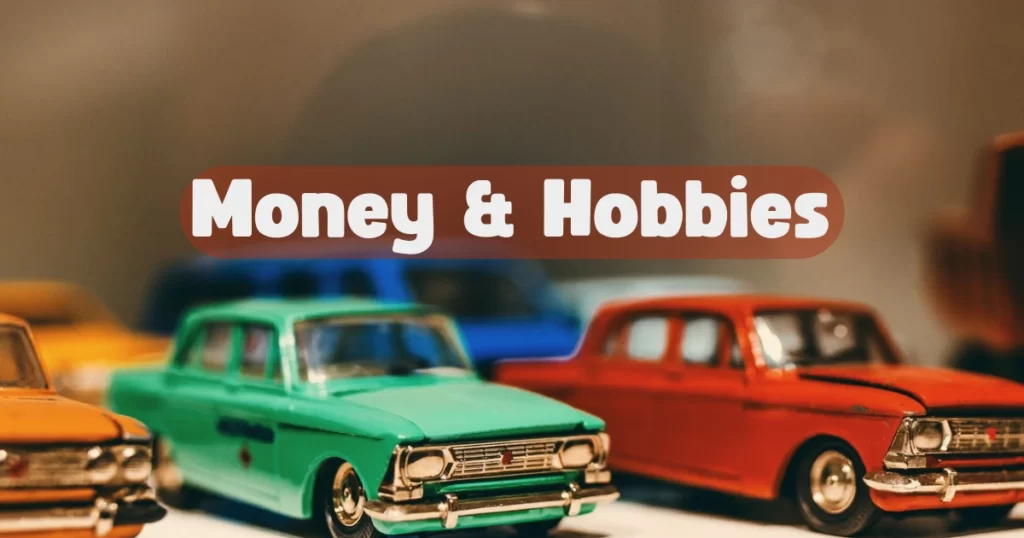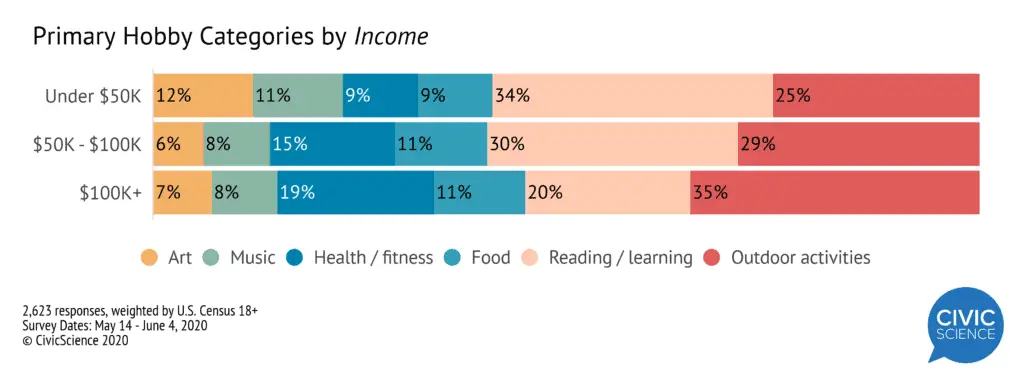
I love watching movies, reading or listening to books, and traveling. Those are my current hobbies that I enjoy doing. Playing the violin is on my top hobby list in my “someday maybe” folder.
What hobbies do you enjoy the most?
One might wonder here, is spending money one of your hobbies? Can we consider spending money a hobby?
In my opinion, spending money isn’t a hobby in and of itself, rather it’s an action that brings that hobby alive and or takes it to the next level. How we spend money on our hobbies becomes a behavior that can affect our overall wellbeing positively or negatively and using the 5 coaching questions below will help you strike a balance between your financial status and reaping the benefits of your hobbies.
Content Covered Today:
What is a hobby?
A hobby is considered to be a regular activity that is done for enjoyment, typically during one’s free time. It can be any activity that you enjoy doing like traveling, gardening, playing music, biking, sailing, hiking. The list goes on and on and there’s a huge list of hobbies that you can check for yourself and in my opinion, there’s never going to be a complete list of hobbies.
Why hobbies are important, and why you’re spending money on them?
There are X benefits of having a hobby to your overall wellbeing and life as mentioned below:
Enjoyment and Happiness
Hobbies bring you joy and happiness before, while, and after doing them. It’s why you voluntarily choose to do them in your free time and not do anything else.
Recharging your batteries
While sleeping and napping are traditional top tools to recharge your batteries. Having a hobby is another tool in the charging toolkits that I coach people to have too since they bring you joy which charges you not only on a mental level, but also on a physical level too.
Protects against dementia
A study found that people who commit more hours to their hobbies per week have low risk of dementia compared to people committing fewer hours to their hobbies per week.
Longevity and functionality in old age
Another study on the relationship between having hobbies and a purpose in life with mortality found that having hobbies and purpose in life may extend not only longevity, but also healthy life expectancy among older adults
Success
Another study on hobbies and success among scientists found that scientists who were engaged with hobbies were more successful than those who weren’t engaged in hobbies.
Potential for making money
When I start playing violin as a hobby, it’ll be a source of joy, happiness, and charging at first, and I’m also seeing it becoming a source of income at a later stage by utilizing it as a side hustle teaching or blogging.
Why spending money isn’t a hobby?
1- Spending isn’t the ultimate goal, it’s part of it
If playing the violin is your hobby, then making lovely sounds and avoiding being kicked out of the house by your wife is going to be your ultimate goal that’ll bring you happiness and shelter obviously.
Spending money in itself, doesn’t have an equivalent goal if considered a hobby. I believe that no one is spending money just for the sake of it. It has to be attached to a bigger goal. Even if you decided to give money to strangers, I it’ll be because of a higher goal of helping people in need for example.
2- Spending and enjoyment don’t mix
Which way is better, paying for your hobby yourself or me paying it for you?
I would be pretty much confident that 99% of the answers will prefer me paying for your hobby. You’ll reap the benefits of the hobby and save money. No matter how important that thing you’re spending money on, the spending part isn’t always a happy part and you’d rather not paying for it if you can.
That’s why in my point of view, spending money in itself won’t cause the happiness and enjoyment we see from hobbies.
Is it okay to spend money on your hobbies?
Spending money is needed to activate your hobbies and or take it to the next level. Regardless of your hobby, there will be some level of payment needed, whether it’s just paying for internet connection or used book, all the way to renting yachts for your sailing hobby.
Getting back to the violin example, I have to purchase the violin itself and some tools, and I’ll have to pay for someone to teach me. On the later stages, I might need some maintenance or fixing fees, maybe I’ll need to upgrade my violin or upgrade my learning course.
Reading books can be a hobby of yours so doing it the right way will justify your spending while falling in the 3 categories that I talked about in spending on books, will be money wasted.
Same if you have playing games as your hobby. If done right, it will be totally worth the spending, otherwise you have to control it for the sake of your financial wellbeing.
A survey done by CivicScience found out that people with high income annually are more likely to prefer hobbies that are outdoor based. You can find more interesting information through this link.

How much should you spend on your hobbies?
There’s no way of determining a specific amount that you can spend money on your hobby. The general rule of the thumb if I’m coaching you will be to check your finances and make sure that your saving goals are in place and won’t be compromised by this spending.
When it comes to spending money on your hobbies, there’s a spectrum that has necessary spending on a side and unnecessary spending on the other side and you have to monitor if you’re spending is on or close to the necessary spending side of it.
As I’ve explained previously, there’s a spectrum when it comes to spending money on your hobby starting from very low to high. What’s critical is that no matter where you are in that spectrum, you should avoid spending too much than what you can afford, otherwise it’ll be an unnecessary spending that I’ve talked about before in detail and how you can control it.
Factors affecting spending your money on your hobbies
- Importance of your hobbies
- Your financial situation: income & expenses
- Your hobbies cost
How to spend wisely on your hobbies?
Here’s me coaching you on how to spend wisely on your hobbies without having it reaching the unnecessary spending side of the spectrum:
How many hobbies you have?
List all the hobbies that you have now and those you wish to have in the future. Aim for quantity.
How much does each cost?
- How much does each hobby cost per year on average?
- How much does each hobby cost for you to just start them?
- What is the lowest price that each hobby can be maintained for few years?
Do your due diligence of the average spending per year for each of those hobbies then rank them from cheap to expensive.
You can also, if you can, identify the cost attached to the different level of experience in each, so how much you’ll need to pay for if you’re a beginner vs an expert if it applies to your hobby.
How much does each mean to you?
- How important your hobbies are to you?
- How critical they are in improving your life’s quality?
By default, all hobbies will be considered very critical to identifying your identity and personality, and your sense of fulfillment and achievement. Most of the time it’ll be the question whether we can afford it or not that will devalue it, so always put this part to sleep when identifying the value of each hobby to you.
How much spare money you have?
- How much money you make?
- How much money you’re spending?
- How much you’re saving from it?
- Is money saved enough to fulfill your saving goals or does it need to increase?
- How much money you have extra to your expenses?
Is there a way of decreasing the cost of your desired hobby?
- Can you rent the tool instead of buying it?
- Can you learn online instead of face to face in a center?
- Can you learn with a group instead of a private tutor?
- Can you start small then scale up later?
Conclusion
Spending money can’t be considered a hobby because it doesn’t fulfill the criteria of a hobby, and in almost all cases, it plays a huge part in activating hobbies and sustaining them which adds value to your overall wellbeing and life’s quality. Spending money on a hobby is a behavior that must be controlled so it won’t cross to the unnecessary spending side of the spending spectrum.